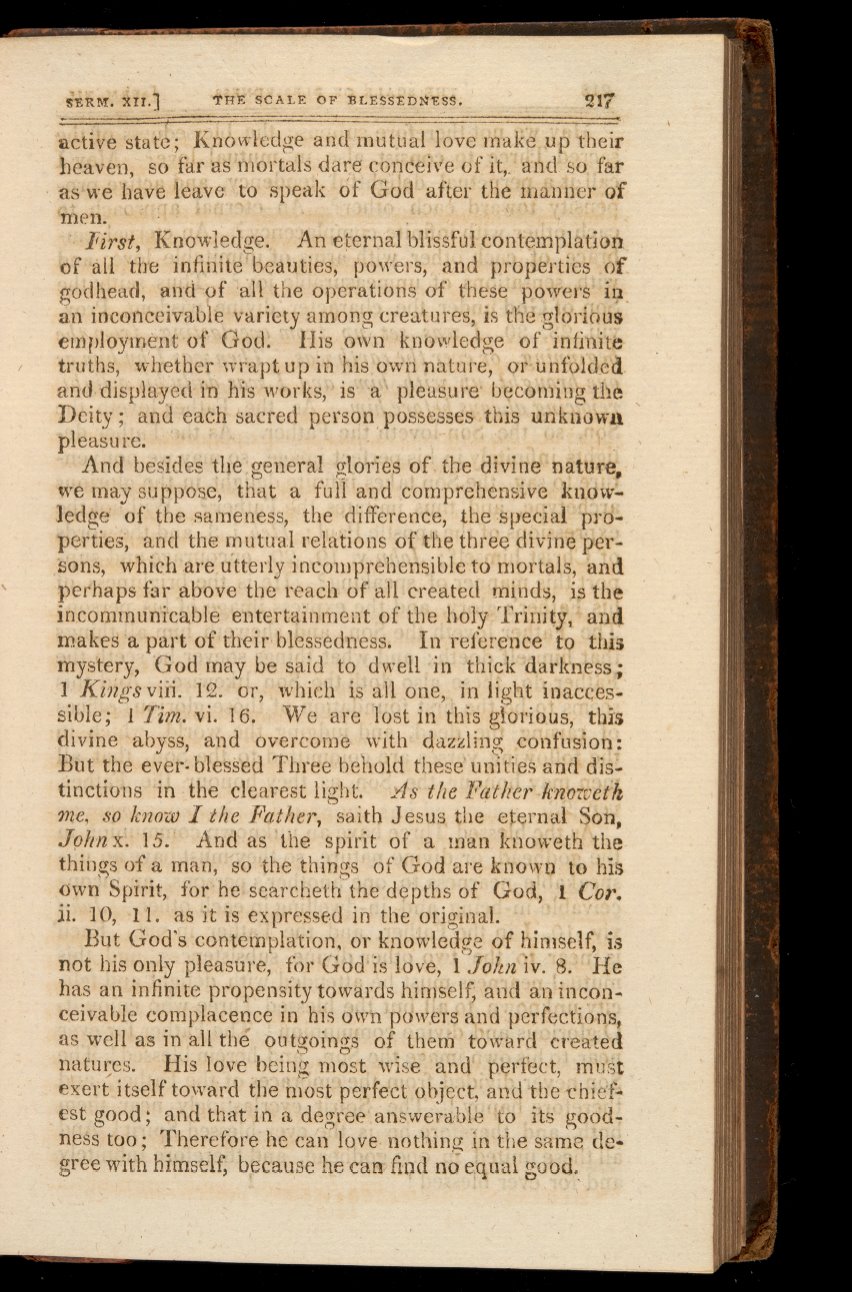

SEAM.
XII.1
THE
SCALE OF BLESSEDNESS.
217
active
state; hnowledge and mutual
love
make
up
their
heaven,
so
far
as
mortals
dare
conceive
of
it,.
and
so
far
as
we
have
leave
to
speak
Of
God after
the
manner
of
men.
first,
Knowledge. An
eternal
blissful
contemplation
of
all
the
infinite beauties,
powers,
and properties
of
godhead,
and
of
all
the
operations
of
these powers in
an
inconceivable variety
among creatures,
is
the
glorious
employment
of
God.
IIis
own knowledge
of
infinite
truths, whether
wrapt
up
in his
own
nature,
or unfolded
.
anddisplayed
in his
works,
is
a
pleasure- becoming
the
Deity
;
and each sacred person
possesses this
unknown
pleasure.
And
besides the
general
glories
of
the divine
nature,
we
may
suppose,
that
a
full
and comprehensive know-
ledge of
the sameness, the difference,
the special
pro-
perties,
and
the mutual relations
of
the
three
divine
per -
sons, which
are
Utterly
incomprehensible to mortals,
and
perhaps
far
above
the reach
of
all
created
minds,
is
the
incommunicable
entertainment of
the holy
Trinity,
and
makes
a
part
of
their
blessedness.
In
reference
to this
mystery,
God
may
be
said to dwell
in thick
darkness;
1
Kings
viii.
12.
or, which
is
all one,
in
light inacces-
sible;
1
Tim.
vi. 16.
We
are
lost
in this glorious,
this
divine
abyss,
and overcome
with dazzling
confusion:
Nit
the
ever-
blessed
Three
behold
these
unities
and
dis-
tinctions
in
the
clearest
light.
As
the
Father
knor
cth
me, so
know
I
the
Father,
saith
Jesus
the
eternal
Son,
Jahn
x. 15.
And
as
the
spirit of a
man knoweth
the
things
of
a man,
so
the things
of God
are
known to his
own Spirit, for he
searcheth
the
depths of God, i Cor.
ii.
10, 11.
as
it
is
expressed
in
the original.
But God's contemplation,
or
knowledge
of
himself,
is
not
his
only
pleasure, for
God
is
live,
1
John
iv.
8.
He
has an infinite
propensity towards
himself;
and
an
incon-
ceivable
complacence
in
his
own
powers and perfections,
as well as
in
all
tlhe
outgoings
of
them
toward
created
natures. His
love being
most
wise
and perfect,
mist
exert itself
toward
the
Most
perfect
object,
and
the
thief-
est good;
and
that
in a
degree answerable
to
its
good
-
ness
too; Therefore
he
can
love nothing
in
the
same
de-
gree
with himself,
because
he
can
find no
equal
good.

















